Since discovering the Miles and Points game 3 years ago, Jeriel has now spent a disproportionate amount of time reading the T&Cs of credit cards and frequent flyer programs. His grand plans for round-the-world premium travel has taken a hit since the arrival of his daughter, but he is still determined to fly as far, frequently and luxuriously as possible on Miles and Points. Expect more family-orientated trip reports and travel tips from him!
I noticed some reader comments on the recent article on the latest Krisflyer promotion asking if it was worth redeeming Premium Economy and Economy awards at around 2.8 to 3.5 cents per mile (after factoring in the additional 15% discount). The response given to those questions (and rightly so) was ‘it depends’, but I suppose that isn’t the most helpful answer if you’re deciding whether or not to pull the trigger on a redemption. This article is a whole lot longer answer to those questions. Be warned though; it may just be equally unhelpful. 😀
My basis thesis is this: all decisions that we make when playing this game boils down to one simple, existential question we each must answer for ourselves: how much do we value a mile? This is not only limited to making award redemptions (using miles), but also when choosing the credit card with which to make day to day purchases (earning miles). If you have accurately and confidently valued the miles for yourself, then making decisions like the ones encountered by our readers should be a little easier.
In one of the very first Milelion articles, Aaron explained how the value of a mile is variable, depending on the class of travel you redeem for. Using the formula; value per mile = (revenue ticket cost – taxes) / no. of miles used, redemptions for Economy tickets generally get you about 2-3c/mile, Business ticket redemptions will fetch you 4-6c/mile, and First Class tickets will give you a return of about 6-9c/mile. That’s all well and good, but if that is the case, why does one of the world’s most well-known (and well-flown) travel hacker only value SQ Krisflyer miles at 1.5 US Cents (around 2.1 cents) each?
I shall try to explain this by exploring two different perspectives; using miles and earning miles.
- Using Miles
Put simply, although it feels and looks good, it is overly simplistic to tag the value of the mile to what a revenue ticket would otherwise cost.
It is certainly click-bait when you say something like ‘I’m flying on a S$20,000 plane ticket and I got it for free!’, and that’s what some travel bloggers do to boost readership. It also makes you feel that you’ve gamed the system and ‘earned’ that S$20,000 ticket through your genius credit card strategies. After all, assuming an earn rate of 4 miles per dollar on specific categories of spending (excluding limited time promotions and sign-up bonuses), theoretically an award redemption on a First Class ticket will give you 9 cents x 4 miles = 36 cents per dollar! That is essentially a 36% rebate on every dollar you’ve spent.
However, if you take a step back and think about it rationally, something about this just doesn’t feel quite right. Are you really getting 36 cents of cold hard cash back for every dollar you’ve spent as you’re stretched out on your double bed sipping away at Krug and shoving caviar in your face at 40,000ft? My argument is probably not.
Another way to think about it is this: imagine that ABC Bank has decided to launch a cashback card with a 36% cashback rate. You hear about it first on Milelion and are one of the first people to get the card. After a year of spending, you found that you have accumulated S$17,850 in cashback credit, which you decide you want to use to go on a holiday to New York. Would you spend all that cash on a return ticket in SQ Suites to JFK, or fly in plain ol’ economy and use the remaining S$16,000 on the other holiday expenses (and probably still have some change left over?) My bet would be on the latter.
In short, thinking you’re actually getting 6-9c of real, monetary value back even when making a First Class award redemption is just being naïve. Ditto for the 4-6c/mile you think you’re getting when making Business Class redemptions.
Even if you could afford this… Would you really?
Well, what then is a mile really worth? The closest you can get to its real, tangible value is the 1-2 cents/mile on Economy redemptions. This is because the revenue cost of the economy ticket is exactly what you would have paid to fly from destination A to B had you not made an award redemption.
At the same time, we know that a mile is definitely worth more than 1-2 cents when we make premium redemptions. The additional space, better food, increased baggage allowance, lounge access and better service are all real and tangible and are surely worth something.
Value and worth are subjective. There are some people who have no qualms about shelling out hundreds of dollars to dine at Michelin-starred restaurants, and others who just cannot understand what the fuss is about, even if they could easily afford it. Similarly, a Business/First class ticket is worth different things to different people. This could be subject to a myriad of factors. To the businessman who flies Business Class for work every week, the premium experience may be worth so little that he’d rather take a road trip than fly for a holiday. To the honeymoon couple who have never flown premium in their lives, they may just be willing to pay a little more for the special occasion.
A simple mental exercise to value a mile could go something like this: imagine an open bidding system for a Business or First class ticket. How much would you pay in actual cash to fly premium? Ask yourself honestly and you may be close to a comfortable cent per mile valuation for your purposes.
If I haven’t done enough to burst your mile valuation bubble (if you had one), there is also the issue of the illiquidity of miles as a currency. So far, all the numbers I’ve given are based on SQ Saver level awards, factoring in the 15% online discount. But as anyone who has even attempted award redemption will tell you, life is not always a bed of roses. More often than not, the exact award you want will not be available. On our end we do our best to remain flexible in our travel times and dates, but sometimes it will be inevitable that one may have to redeem for Standard awards or even Partner awards, which represent less value. The inflexibility in the ability of miles to purchase the exact ticket you want subtracts significantly from its inherent value as a currency.
For my own purposes, I have valued my KF miles at 2.5 cents / mile. At 91,375 miles for a one way ticket to Europe / U.S. West Coast on First/Suites Class, that means I’m prepared to pay about S$2284 to fly First on that route. That sum may be higher or lower for you, so that’s something you’ll have to figure out for yourself.
- Earning Miles
At this juncture I’m sure some of you must have your hands up in the air. How can I possibly be valuing award redemptions in terms of spending real cash when these are rewards points gotten free?
Well, the purchasing power of a mile may be variable, but we acquire or earn our miles at a very real, tangible cost which is more or less fixed; its opportunity cost.
Have you ever called for a bill at a restaurant and proudly took out your UOB Preferred Platinum Amex or your HSBC Advance Visa Platinum, all ready to earn the 4 miles/dollar, only for the wait staff to intone ‘eh Sir, got 15% off if you use DBS card leh.’ You have a DBS Altitude Card in your wallet, but you know that only gives you 1.2 miles/dollar. That a massive difference of 2.8 miles and your upcoming plans to fly Suites to London flashes before your eyes. You hesitate and ask yourself in a hushed whisper ‘What would Milelion Do (WWMD)?’
It is easy to see the opportunity cost here. You are essentially choosing between 2.6 miles/dollar OR 15% off your bill. Assuming a bill of S$100, it comes down to 260 miles vs. a S$15 discount. If you choose the miles, you have ‘paid’ S$15/260 miles = 5.8 cents/mile. You remember that Suites redemptions give you value of 6-9 cents/mile and you are satisfied with your decision.
But wait a minute, the S$15 you’ve given up is as good as cash, there’s no variable value there. Taken to the extreme, if all the miles you have were obtained at such an opportunity cost, suddenly the one-way Suites ticket to London I was talking about would balloon to 91375 miles x 0.058 = S$3944. Doesn’t look too value for money now does it?
Of course, this is just one possible scenario to illustrate opportunity cost. There are other, more complicated examples with similar consequences. One scenario which I’ve spent countless hours arguing with some friends about involve the ‘enhanced interest rate savings accounts’ offered by quite a few banks here. This includes the famous OCBC 360 Account, Standard Chartered Bonus$aver Account and similar offerings by the other banks. Do you choose to meet the minimum spend on the prescribed credit/debit card (which usually has little to no rewards points) to hit the 3+% of interest on your account balance, or use a points-earning credit card? That interest earned is too a real, tangible opportunity cost to alternate, mile-earning credit card strategies.
This is where a reasonable valuation of your miles come in handy. Using my example of 2.5 cents a mile, at an earn rate of 4 miles/dollar, I’m essentially saying that I will only accept an opportunity cost only up to 10 cents/dollar (or a 10% discount). I can then use that value to quickly calculate at the point of sale if it is worth it to go for the miles, or take the other option. In the above example, the incremental 2.6 miles is only worth 6.5 cents (or 6.5%). So while I wouldn’t know WWMD exactly, I for one would go for the 15% discount in a heartbeat.
If you keep strictly to your valuation, you ensure that none of your miles have been obtained for a higher opportunity cost than your pre-defined value (in my case, 2.5 cents/mile). This then comes full circle when I make a redemption. Obviously, I still try to redeem for premium tickets to maximize the value I’m getting, but if push comes to shove and I have to redeem for a less than ideal product (for e.g. Economy or even Silkair Business Class), I am comfortable with making the decision as I know exactly how much I am ‘paying’ for it.
To illustrate this, take my recent trip to Siem Reap under the 50% Silkair redemption promotion. I used 40,000 miles in total for return Business Class tickets for my wife and myself. Some may not be comfortable using hard-earned miles on an inferior product. It was a pretty last minute trip, so economy tickets on the same carrier (Silkair) and even on budget airlines were going for S$800/pax return. Revenue tickets on SIN REP Business Class on Silkair goes for about S$1750/pax return. Based on that revenue ticket cost, I was getting about 7-8 cents/mile on that redemption. While it was thus a good redemption to make on paper, I can confidently say very little of us will value 2 hours in Silkair Biz at S$1.7k, so that 7-8 cents/mile is not a very reliable metric on which to base my decision on.
No champagne, meals are essentially economy grub in glassware… Who even pays revenue prices?
However, the decision becomes easier when using my valuation of 2.5 cents/mile. Thinking from that perspective, I ‘paid’ S$500 per ticket. That is even less that what I would have paid for a (albeit overpriced) economy ticket for the dates I wanted to travel on. With that logic, it was an acceptable redemption to make.
TL;DR?
Set an (essentially) arbitrary cent per mile value with which you can make decisions on earning and redeeming miles. I recommend this to be between 2 to 3 cents per mile.
Do you agree with my logic? How do you value your miles and craft your spending strategies to truly maximize the value you get out of your spending? Share your thoughts in the comment section below!
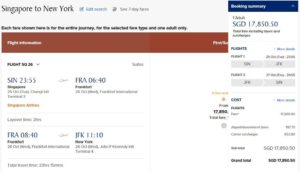
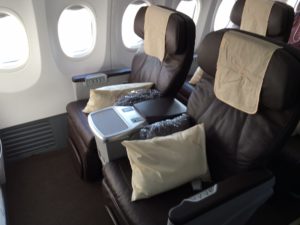


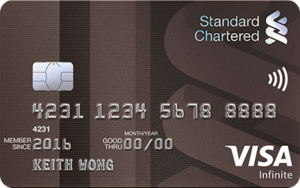
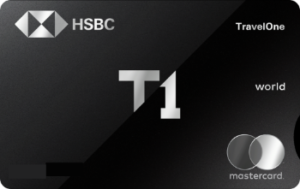
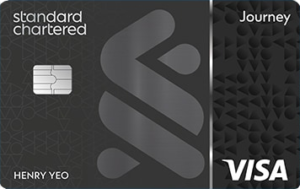


How would the valuation swing when comparing your value of 2.5 cents against the cost of acquisition (referring to those miles that we earned by paying the card annual fee which is typically about 2 cents per mile)? Thanks
it doesn’t swing perse; if I value a mile at 2.5 cents, and someone is offering to sell me one for 2 cents, then it will represent a reasonable deal for me. Of course, that doesn’t mean that one should definitely buy miles at 2 cents each. When we acquire miles, we would try to acquire it for as little cost as possible. The 2.5 cents figure I’ve set for myself is more like a limit. In other words, I will strictly NOT acquire miles that cost me more than 2.5 cents each. I would say most of our miles… Read more »
Another perspective – if you find yourself having trouble deciding your personal price point of a mile, the bank annual fee rate is as good a place to start, if you’ve already decided that it’s a price you’re willing to pay for.
Chances are that you actually value it higher, but using the conservative 2¢ value allows you to make the decisions that Jeriel’s described (e.g. choosing between discount or mile earn) in the meantime – you can always adjust the value later.
Actually I have a feeling when “paying for miles” that is hard to even get rid of. My thoughts are that if I have to spend the $$ already (e.g. $2000 for school fees) then it will earn me zero miles if I paid in cheque vs paying by PayPal (which the school charges me 2.6%. How dare they). So I earn points (yes I paid some cash for it) but isn’t it better than nothing for my $2000 expenditure. I believe this is stupid (logically) but I don’t know how to advise myself to get rid of this silly… Read more »
Don’t be harsh on yourself. You can buy miles using these extra fees as long as the cost is less than value.